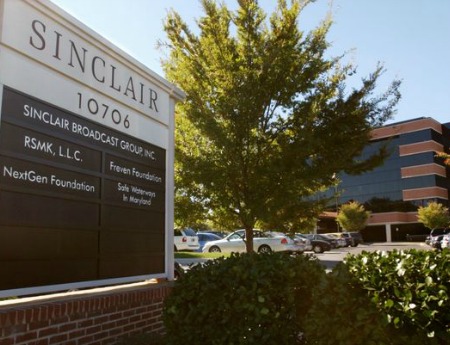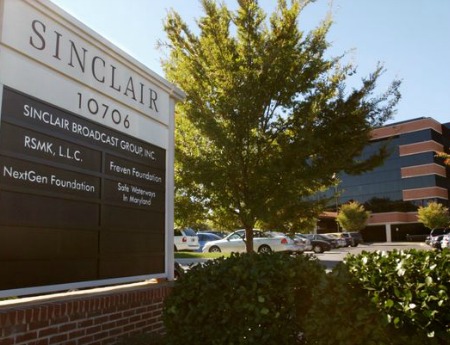Court Could Aid Cable Effort to Block Sinclair Deal

The smarter way to stay on top of broadcasting and cable industry. Sign up below
You are now subscribed
Your newsletter sign-up was successful
WHY THIS MATTERS: A lawsuit to reverse the FCC’s reinstatement of the UHF station-cap discount could call Sinclair’s proposed purchase of Tribune Media stations into question.

Cable operators could get some help from a U.S. Court of Appeals in their opposition to Sinclair Broadcast Group’s $3.9 billion acquisition of Tribune Media stations, though one legal issue is “standing” in their way, literally.
That would be whether those suing to reverse the FCC’s related UHF discount decision even have the legal standing to do so. Without the discount, reinstated in April 2017, Sinclair can’t buy Tribune’s stations without blowing by the FCC’s 39% cap on nationwide audience reach.
Cable operators fear a bulked-up Sinclair will be able to dictate more favorable retransmission- consent terms and higher fees for broadcasters. Sinclair paid $9 million in 2016 to settle an FCC investigation into coordinated negotiations.
[FCC's Pai Won't Commit to Delaying Sinclair Decision for Court Ruling]
While predicting what judges will do from oral argument is an inexact science at best, the oral argument in Free Press’s challenge to the FCC’s reinstatement of the UHF discount on April 20 signaled at least two of the judges had issues with the Republican-led FCC’s return of a discount that seemed clearly to have outlived its usefulness.
“The problem here is you have some pretty powerful, and uncontested, findings of not just the obsolescence but the harm to the public interest that has been caused by perpetuating the UHF discount,” one of the U.S. Court of Appeals for the D.C. Circuit judges remarked, according to audio from the session. She said that with the transition to digital, people could “blow right by” the 39% cap using the discount. The judge also likened the cap to the speed limit in D.C.: “People were waving as they went by.”
The smarter way to stay on top of broadcasting and cable industry. Sign up below
Another judge suggested the FCC was keeping the discount on life support just to buy more time. Only two judges’ votes are needed to overturn the FCC’s decision.
[D.C. Court Hears Challenge to FCC's UHF Discount Decision]
But to get to those underlying issues, the judges suggested the groups suing the FCC had to identify specific injured parties among their members. If not, it may not matter how strong a case they make against the discount.
The bad news for those looking to block the Sinclair deal via the roundabout route of eliminating the UHF discount is that Free Press did not include testimonials from any viewers in areas affected by the discount. One attorney who wants Free Press to prevail said the standing issue was definitely of concern.
The Supreme Court has held that an organization needs to identify individual members who have suffered the particular harm that public-interest groups are alledging were produced by a decision that’s being challenged.
The good news is that during oral arguments, one of the judges signaled that the standing issue could be corrected with a supplemental filing. The better news is if that remedy fills the bill, the judges seemed to share Free Press’ consternation that the discount — which dates from the analog era, when UHF signals were inferior to VHF — had no business resurfacing.
Even FCC chairman Ajit Pai has conceded the discount is an anachronism, but argues that the agency should not have eliminated it without also considering possible changes to the 39% cap, which is currently underway.
Foes of the UHF discount have latched onto the judges’ tough questioning to call for the FCC to delay a decision on the merger, pending the court’s ruling.
At the current pace, the FCC isn’t likely to decide any sooner than late June, even with Sinclair filing its fourth version of the deal last Tuesday (April 24).The FCC must still put the new version out for what’s likely at least a 30-day comment period, maybe more, and then must provide time for replies.
[Sinclair Deal Shot Clock Still Paused]
Merger Approval Delay Sought
Certainly, Sinclair opponents were latching onto the oral argument reception as good news, as well as a chance to call for delaying the FCC vote on the deal. “If there is an ounce of ethical leadership left in Pai, he will not allow the FCC to act on this merger until after the court has ruled,” Karl Frisch, executive director of deal critic Allied Progress, said.
“We think it’s pretty bold of Sinclair to be proclaiming that they are working on finalizing the merger when the D.C. Circuit could obliterate it in the two months or so it will take them to decide the case,” an aide to Rep. Tony Cardenas (D-Calif.) told B&C. “Sinclair is probably counting on the FCC approving the merger before the D.C. Circuit decision comes down. If the FCC goes ahead with that, it would be nothing short of government malpractice.”
Contributing editor John Eggerton has been an editor and/or writer on media regulation, legislation and policy for over four decades, including covering the FCC, FTC, Congress, the major media trade associations, and the federal courts. In addition to Multichannel News and Broadcasting + Cable, his work has appeared in Radio World, TV Technology, TV Fax, This Week in Consumer Electronics, Variety and the Encyclopedia Britannica.

